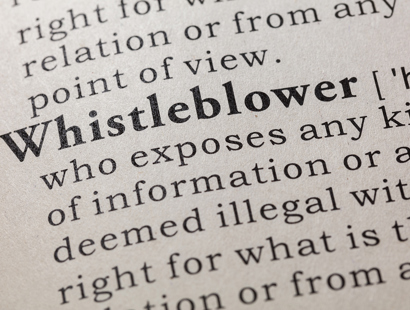
Do charity trustees have whistleblower protection?
Whistleblowing, an action someone takes to report wrongdoing at work that affects others, comes with protections for most—but not ordinarily volunteers, or those with no enforceable employment contracts.
But a recent case in which a charity trustee claimed entitlement to such protections—including ‘detriment’, defined as worsened circumstances or treatment following a disclosure—suggests the law in this area is not clear-cut.
In this briefing, associate Sam Lawn considers the details and impact of the case.
MacLennan v British Psychological Society
Dr MacLennan was a trustee and President-Elect of the British Psychological Society and contended that he was entitled to protection from whistleblowing detriment on two grounds:
- that he was a ‘worker’ under the Employment Rights Act 1996; and
- that he was ‘analogous to a worker’ by virtue of Articles 10 and 14 of the
European Convention on Human Rights and that failure to confer whistleblowing protection would amount to an infringement of his human rights.
An Employment Tribunal considered that Dr MacLennan’s argument failed on both counts. The Tribunal’s decision was strongly influenced by the fact that his position as a trustee was unremunerated. Dr MacLennan appealed.
The appeal decision
On the first point, the Employment Appeal Tribunal (EAT) agreed with the Tribunal’s decision that Dr MacLennan was not a worker principally because there was no intention to enter into a contractual relationship. They confirmed that, although he held considerable responsibilities in his role as trustee, there was no contractual relationship or intent to enter into one.
On the second point, however, the EAT’s view differed from the Employment Tribunal. They disagreed with the Tribunal’s approach to the interplay between the Employment Rights Act 1996 and the European Convention on Human Rights (ECHR).
Dr MacLennan argued that Article 10 and 14 of the ECHR gave him whistleblowing protection because his situation was analogous to a worker (as defined in section 230(3)(b) of the Employment Rights Act). He said that failure to provide that protection would be an unjustified infringement of his human rights.
The EAT found that the Employment Tribunal had failed to apply a “broad brush” approach to this question and had unduly focused upon Dr MacLennan’s lack of remuneration.
They provided a list of further factors which should be considered when deciding whether the role of charity trustee was ‘analogous to a worker’ for whistleblowing purposes:
- the type of role undertaken and its level of responsibility
- the duties of the role
- the likelihood that the person will become aware of the wrongdoing
- the importance of the person making disclosures of wrongdoing in the public interest
- the vulnerability of the person to retaliation
- the availability of alternative routes to making disclosures, and
- any other relevant distinctions between the person and an employee or worker of the entity.
The case was remitted to the Employment Tribunal to reconsider the issue, but the EAT gave a strong indication that in their view, charity trustees would be protected from whistleblowing detriment. However, it will be for the Employment Tribunal to apply this on the facts of this case.
Don’t assume a lack of entitlement: key takeaways
Given the EAT’s guidance in this case, charities should no longer assume that their trustees will not be entitled to whistleblowing protection because they are unpaid. Instead, the position can be much more complex where trustees can be considered “analogous” to workers, for example, where they have wide-ranging responsibilities, a high likelihood of becoming aware of wrongdoing, and/or where trustees are particularly vulnerable as a result of making a disclosure (e.g. if speaking up could impact their career).
The EAT’s approach is perhaps understandable, given that trustees are expected to carry out a senior role within charities and are under a duty report wrongdoing to the Charity Commission. It may stand to reason that they should expect to have protection from detriment when carrying out such duties. However, this represents a decisive shift away from previous cases, which had held that trustees (as volunteers) were not protected under whistleblowing legislation.
However, with that in mind, it remains unlikely that trustees will be able to claim the benefits of worker status where the parties did not intend to enter into a contractual relationship. The absence of remuneration to trustees is a significant factor in determining this and means that while trustees are likely to have whistleblowing protection going forward, it remains the case that they will not be able to claim worker benefits such as the national minimum wage and paid holiday.
Get in touch
If you would like to speak with a member of the team you can contact our charity law solicitors by email, by telephone on +44 (0)20 3826 7510 or complete our enquiry form.




